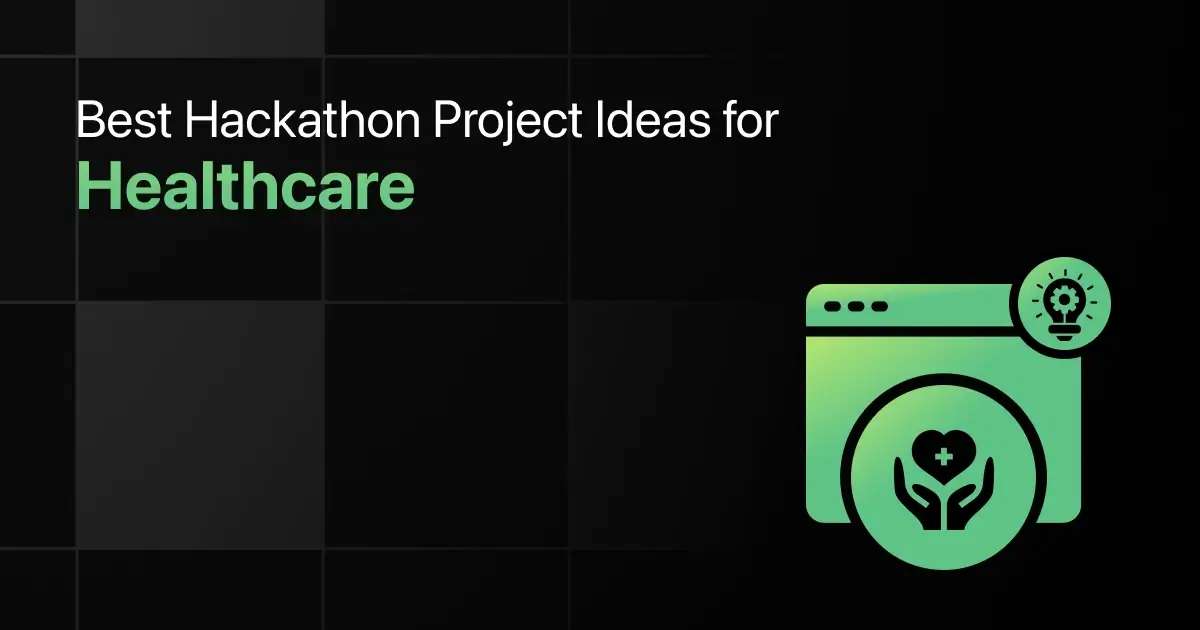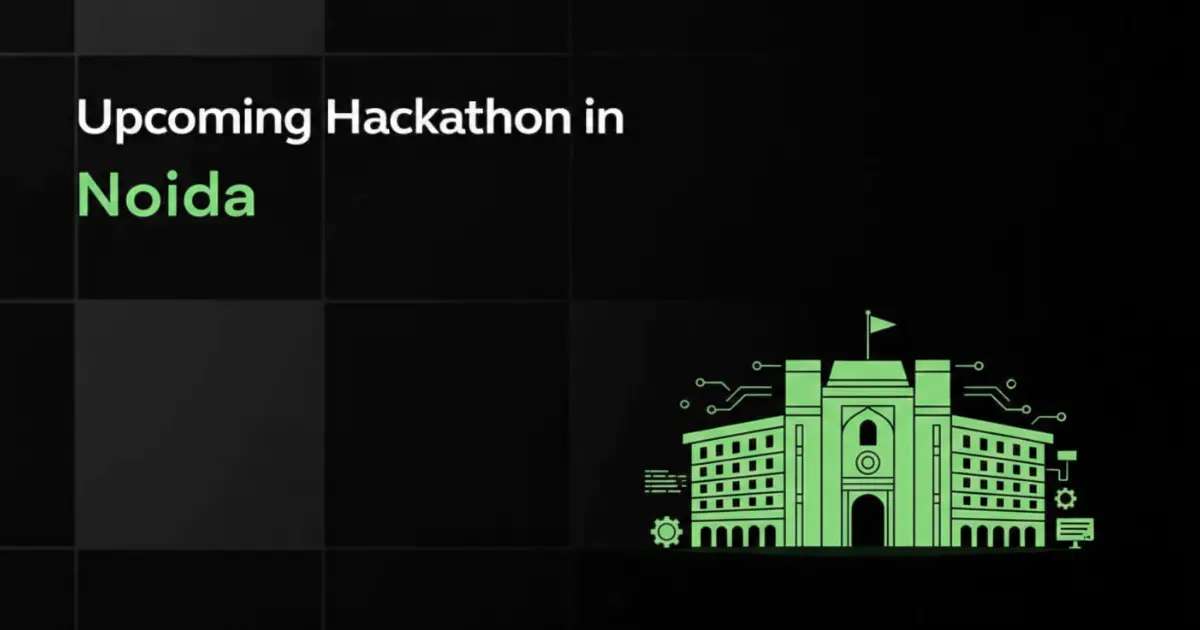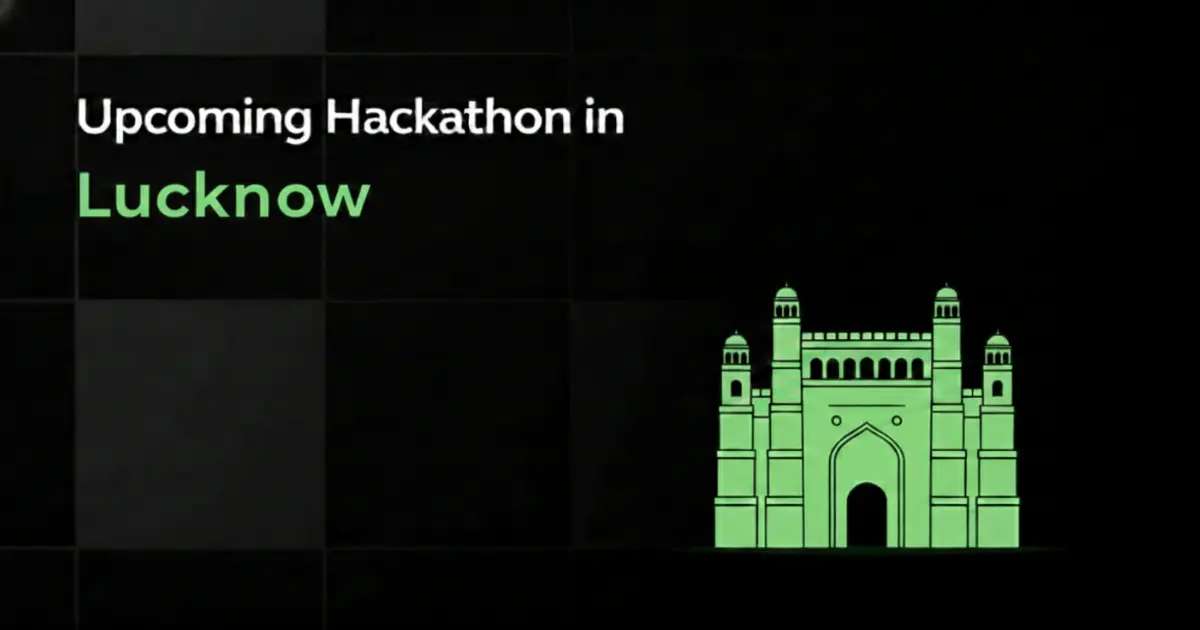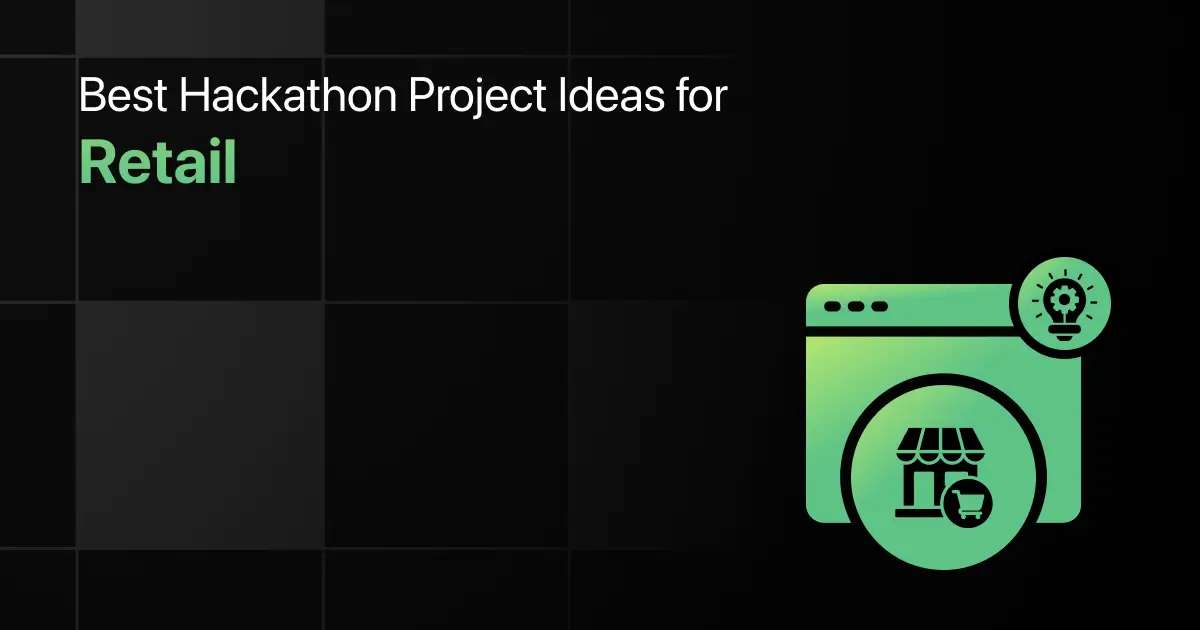Best Hackathon Project Ideas for Healthcare

Have you ever wondered how technology can transform patient care or make hospitals more efficient? Hackathons in healthcare are driving exactly that kind of change.
These events bring together developers, designers, and medical professionals to address real-world challenges in the healthcare sector. From remote patient monitoring to AI-driven diagnosis tools, innovation in this field is creating life-saving solutions every day.
In this article, we have listed some of the most practical and innovative hackathon ideas for healthcare that focus on improving medical accessibility, diagnosis accuracy, and overall patient experience.
Top Healthcare Hackathon Projects – Overview
Here’s an overview of the 10 best medical hackathon project ideas:
| S.No. | Project Title | Complexity | Estimated Time | Source Code |
|---|---|---|---|---|
| 1 | Medicine Reminder and Tracker App | Easy | 2–3 days | Get Started |
| 2 | Virtual Doctor Appointment System | Easy | 2–3 days | Get Started |
| 3 | Health Record Management Portal | Medium | 3 days | Get Started |
| 4 | AI-Based Symptom Checker | Medium | 3–4 days | Get Started |
| 5 | Smart Pill Dispenser for Patients | Medium | 3–4 days | Get Started |
| 6 | Mental Health Chatbot | Medium | 3–4 days | Get Started |
| 7 | IoT-Enabled Patient Monitoring System | Hard | 4–5 days | Get Started |
| 8 | AI Tool for Disease Detection from X-rays | Hard | 4–5 days | Get Started |
| 9 | Emergency Response and Ambulance Tracker | Hard | 4–5 days | Get Started |
| 10 | Predictive Healthcare Analytics Dashboard | Hard | 5 days | Get Started |
Key Focus Areas in Healthcare Hackathons
Healthcare hackathons focus on solving real problems that improve access, efficiency, and outcomes in the medical field. Here are some key areas teams often explore:
- Remote Health Monitoring: Building IoT or mobile-based systems to track patient vitals in real time.
- Telemedicine Solutions: Creating digital tools that connect doctors and patients through secure virtual consultations.
- Data Management and Security: Designing systems for safe storage and sharing of electronic health records.
- AI and Diagnostics: Using artificial intelligence to detect diseases or analyze medical images accurately.
- Mental Health Support: Developing chatbots or apps that promote mental well-being and provide counseling access.
- Emergency and Response Systems: Improving communication and response time during medical emergencies.
10 Best Healthcare Hackathon Project Ideas
Healthcare hackathons are an excellent opportunity to build real-world solutions that make medical care faster, safer, and more efficient.
Here are the best hackathon ideas for healthcare that combine technology with innovation to create lasting impact.
1. Medicine Reminder and Tracker App
This project is about building a mobile app that reminds users to take their medicines on time and tracks their intake history through smart alerts. You will learn how to implement real-time notifications, cloud synchronization, and intuitive health-tracking interfaces.
Duration: 2–3 days
Difficulty Level: Easy
Tech Stack Required: Flutter, Firebase, Node.js, Twilio API
Implementation Steps:
- Build user authentication and profile setup
- Add medicine scheduling and reminder system
- Enable tracking and reporting dashboard
- Integrate SMS or voice notifications
Key Features:
- Smart alerts and notifications
- Dosage tracking and reminders
- Multi-user support for families
- Cloud backup for prescriptions
Learnings:
- Push notification integration
- Database management
- Healthcare UI/UX design
- Cloud synchronization
Real-World Application:
- Supports elderly patients with medication schedules
- Reduces missed doses
- Useful for hospitals and clinics to track adherence
2. Virtual Doctor Appointment System
This project is about developing a secure online platform where patients can schedule and attend video consultations with doctors remotely. You will learn how to integrate WebRTC for live calls, manage user authentication, and handle patient data safely.
Duration: 2–3 days
Difficulty Level: Easy
Tech Stack Required: React, Express.js, WebRTC, MongoDB
Implementation Steps:
- Create patient and doctor login modules
- Set up appointment scheduling
- Integrate WebRTC for video consultation
- Add prescription upload and download feature
Key Features:
- Secure video calling
- Appointment and reminder system
- Prescription management
- Doctor feedback and reviews
Learnings:
- WebRTC implementation
- Secure data handling
- RESTful API integration
- Frontend-backend synchronization
Real-World Application:
- Enables telemedicine for rural users
- Reduces hospital crowding
- Improves doctor accessibility
3. Health Record Management Portal
This project is about creating a centralized portal for patients and doctors to store, access, and share electronic medical records securely. You will learn how to build encrypted storage systems, manage access permissions, and deploy cloud-based data solutions.
Duration: 3 days
Difficulty Level: Medium
Tech Stack Required: Angular, Django, PostgreSQL, AWS
Implementation Steps:
- Build user roles and secure login
- Add encrypted EHR upload and retrieval
- Set permission-based access for doctors
- Implement cloud backup and recovery
Key Features:
- Secure health data storage
- Role-based access control
- File versioning
- Cloud synchronization
Learnings:
- Authentication and encryption
- Cloud-based file storage
- Database management
- Backend scalability
Real-World Application:
- Streamlines hospital data management
- Eliminates paper records
- Enables multi-hospital data sharing
4. AI-Based Symptom Checker
This project is about designing an AI-powered chatbot that predicts possible health conditions based on user-reported symptoms. You will learn how to train machine learning models, implement natural language processing, and build conversational healthcare tools.
Duration: 3–4 days
Difficulty Level: Medium
Tech Stack Required: Python, Flask, OpenAI API, Scikit-learn
Implementation Steps:
- Train ML model on symptom dataset
- Build conversational chatbot interface
- Implement confidence scoring
- Integrate nearby hospital recommendations
Key Features:
- AI-driven prediction
- Conversational interface
- Confidence-level output
- Location-based suggestions
Learnings:
- Natural language processing
- AI model training and testing
- Chatbot deployment
- Real-time data interaction
Real-World Application:
- Helps users pre-screen symptoms
- Reduces unnecessary clinic visits
- Improves online diagnosis accuracy
5. Smart Pill Dispenser for Patients
This project is about developing an IoT-powered device that automatically dispenses the correct medicine dose at specific times. You will learn how to combine hardware sensors with software logic and manage real-time alerts through cloud communication.
Duration: 3–4 days
Difficulty Level: Medium
Tech Stack Required: Arduino, C++, MQTT, Node.js
Implementation Steps:
- Configure IoT hardware
- Build real-time clock-based dosage system
- Connect to mobile dashboard
- Enable missed-dose notifications
Key Features:
- Automated medicine dispensing
- IoT-based alerts
- Live status updates
- Multi-patient management
Learnings:
- IoT device setup
- Real-time communication
- Hardware-software integration
- Embedded logic control
Real-World Application:
- Aids chronic patients and elderly users
- Ensures accurate dosage
- Can be used in home or hospital care
6. Mental Health Chatbot
This project is about building an AI chatbot that interacts with users, tracks moods, and offers mental health support resources. You will learn how to train sentiment analysis models, design conversational flows, and maintain user privacy in sensitive domains.
Duration: 3–4 days
Difficulty Level: Medium
Tech Stack Required: Python, TensorFlow, Dialogflow, Firebase
Implementation Steps:
- Train chatbot with mental health datasets
- Add NLP for emotion recognition
- Implement mood tracking and journaling
- Link verified mental health resources
Key Features:
- Daily mood check-ins
- Emotion detection
- Anonymous chat mode
- Resource sharing and helpline links
Learnings:
- NLP model training
- Sentiment analysis
- User data privacy management
- Chatbot design principles
Real-World Application:
- Provides mental wellness support
- Accessible for remote or private users
- Can be used by NGOs or universities
7. IoT-Enabled Patient Monitoring System
This project is about creating an IoT system that monitors patient vitals like heart rate, oxygen level, and temperature in real time. You will learn how to connect sensors with cloud dashboards, process live data streams, and trigger alerts for critical health conditions.
Duration: 4–5 days
Difficulty Level: Hard
Tech Stack Required: Raspberry Pi, Node-RED, AWS IoT, Python
Implementation Steps:
- Connect sensors to IoT hardware
- Stream live health data to the cloud
- Build dashboard for doctors
- Trigger alerts for abnormal readings
Key Features:
- Real-time monitoring
- Automated alerts
- Data visualization
- Multi-patient support
Learnings:
- IoT data pipelines
- Cloud integration
- Data visualization dashboards
- Edge computing basics
Real-World Application:
- Remote patient supervision
- Reduces hospital readmissions
- Ideal for ICU or elderly care
8. AI Tool for Disease Detection from X-rays
This project is about building an AI model that analyzes X-ray images to detect diseases such as pneumonia or tuberculosis. You will learn how to preprocess image data, train convolutional neural networks, and deploy AI models for healthcare use.
Duration: 4–5 days
Difficulty Level: Hard
Tech Stack Required: Python, TensorFlow, OpenCV, Flask
Implementation Steps:
- Collect and preprocess datasets
- Train CNN model for image classification
- Build interface for image uploads
- Deploy with Flask or Streamlit
Key Features:
- Automated image diagnosis
- Explainable visual output
- Multi-disease classification
- Fast processing
Learnings:
- CNN model training
- Image preprocessing
- Model deployment
- Explainable AI (XAI)
Real-World Application:
- Assists radiologists with diagnosis
- Useful for rural health centers
- Reduces analysis time
9. Emergency Response and Ambulance Tracker
This project is about creating a real-time tracking platform that connects ambulances, hospitals, and patients for faster emergency coordination. You will learn how to implement GPS tracking, real-time updates, and map-based route optimization.
Duration: 4–5 days
Difficulty Level: Hard
Tech Stack Required: React Native, Google Maps API, Firebase, Node.js
Implementation Steps:
- Build SOS and alert system
- Add real-time ambulance tracking
- Integrate hospital dashboard
- Set up route optimization
Key Features:
- Live tracking and ETA
- Hospital bed availability
- Emergency call routing
- Route optimization engine
Learnings:
- GPS tracking APIs
- Real-time communication
- Map-based data visualization
- Cloud synchronization
Real-World Application:
- Improves emergency response
- Helps hospitals manage capacity
- Reduces patient transfer time
10. Predictive Healthcare Analytics Dashboard
This project is about developing a data analytics dashboard that forecasts disease trends and predicts hospital resource needs. You will learn how to apply machine learning for prediction, visualize healthcare data, and automate real-time reporting.
Duration: 5 days
Difficulty Level: Hard
Tech Stack Required: Python, Pandas, Power BI, Flask
Implementation Steps:
- Collect and preprocess medical datasets
- Train predictive ML models
- Create data visualization dashboard
- Automate reporting and insights
Key Features:
- Predictive analytics
- Interactive dashboards
- Real-time insights
- Cloud report export
Learnings:
- Data analysis and modeling
- Dashboard design
- ML integration with BI tools
- Data-driven decision systems
Real-World Application:
- Helps hospitals forecast patient load
- Supports government health analytics
- Aids in disease prevention planning
Examples of Top Healthcare Hackathon Winners
1. Voice and Sentiment Analysis – WEX Health & Benefits AI Hackathon 2025
This AI-powered customer support assistant from the WEX Health & Benefits AI Hackathon 2025 automates call transcription, sentiment analysis, and response summarization to improve healthcare service interactions and training efficiency.
2. PostOp | Physical Therapy AI – Future of Healthcare Hackathon 2022
Developed at Datavant’s Future of Healthcare Hackathon 2022, this app helps patients maintain post-surgery physical therapy routines using AI-based body movement tracking through Google’s MediaPipe Pose Estimation.
3. ExperifyHealth – Health Innovation Hackathon (Ottawa)
Created at the Ottawa Hacking Health Hackathon, ExperifyHealth connects patients in hospitals and care facilities through shared interests to combat loneliness and improve emotional well-being during treatment.
4. AlgoRhythm – Hack&Heal Hackathon 2022
AlgoRhythm, a top-three winner at Junction’s Hack&Heal 2022, is a rhythmic therapy app designed to help children with dyslexia and aphasia improve language and speech abilities through music-based exercises.
Final Words
Healthcare hackathons encourage innovation that directly improves people’s lives. Building solutions in this space helps you learn, collaborate, and create technology that makes healthcare smarter, faster, and more inclusive.
Explore More Hackathon Articles
- Hackathon Prep
- Hiring Companies
- Join Hackathon
- Win Hackathon
- Hackathon Basics
- Global Hackathons
- Beginner Hackathons
- AI Projects
- SIH Projects
- Unique Projects
FAQs
The best project ideas for healthcare hackathons include telemedicine apps, AI diagnosis tools, patient monitoring systems, and predictive dashboards that improve accessibility, accuracy, and overall healthcare efficiency.
Healthcare problems suitable for hackathons focus on patient data management, remote care, early disease detection, and mental health support — areas where technology can simplify and scale real-world healthcare challenges.
You can make your healthcare hackathon project innovative by using AI, IoT, or data analytics, addressing an unmet need, and ensuring your solution is practical, scalable, and user-friendly.
Healthcare hackathons do not require deep medical knowledge but benefit from understanding healthcare workflows, patient challenges, and compliance factors like data privacy and accessibility.
You can find healthcare datasets from sources like Kaggle, WHO, CDC, and government health portals, offering real medical data for disease prediction, analytics, and AI-based healthcare projects.
Related Posts


Upcoming Hackathons in Noida
As February 2026 approaches, it's time to gear up for some of the most exciting hackathons happening in Noida. If …
Warning: Undefined variable $post_id in /var/www/wordpress/wp-content/themes/placementpreparation/template-parts/popup-zenlite.php on line 1050








